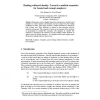Free Online Productivity Tools
i2Speak
i2Symbol
i2OCR
iTex2Img
iWeb2Print
iWeb2Shot
i2Type
iPdf2Split
iPdf2Merge
i2Bopomofo
i2Arabic
i2Style
i2Image
i2PDF
iLatex2Rtf
Sci2ools
DAARC
2009
Springer
2009
Springer
Binding without Identity: Towards a Unified Semantics for Bound and Exempt Anaphors
Expressions such as English himself are interpreted as locally bound anaphors in certain syntactic environments and are exempt from the binding conditions in others. This article provides a unified semantics for himself in both of these uses. Their difference is reduced to the interaction with the syntactic environment. The semantics is based on an extension of the treatment of pronominals in variable-free semantics. The adoption of variable free semantics is inspired by the existence of proxy-readings, which motivate an analysis based on Skolem functions. It is explained why certain anaphor types allow proxy-readings whereas others do not.
| Added | 26 May 2010 |
| Updated | 26 May 2010 |
| Type | Conference |
| Year | 2009 |
| Where | DAARC |
| Authors | Eric Reuland, Yoad Winter |
Comments (0)

